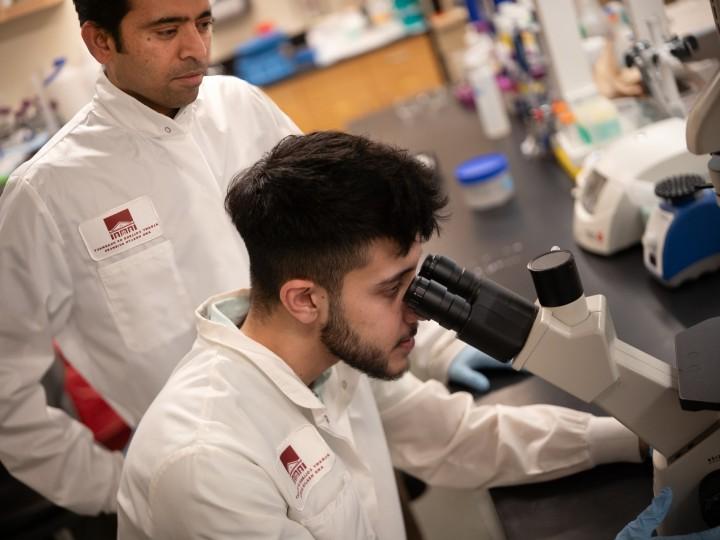Prepare for careers and advanced study in fields including health care, public health, biotechnology and pharmaceutical sciences. The degree in microbiology at ACPHS offers extensive hands-on learning and research opportunities, state-of-the-art lab and research facilities, personalized advising and strong pre-med support.
As one of the few colleges in the Northeast to offer an undergraduate microbiology program, ACPHS provides a unique opportunity to gain specialized skills that you won’t get in a traditional biology program — and a competitive edge in the job market when you graduate. Almost all our alumni go on to graduate or professional schools or find careers in the healthcare or biopharmaceutical industry.
Engage in laboratory-based independent research projects beginning in your first year, working side-by-side with faculty with expertise in bacteriology, virology, immunology and cell biology. Participate in biopharmaceutical internships that often lead directly to job opportunities. Prepare for advanced studies through a rigorous core curriculum based on the guidelines of the American Society for Microbiology.
You can specialize your microbiology degree in Biomedical Microbiology, Public Health Microbiology/Infectious Disease Epidemiology, or Industrial/Pharmaceutical Microbiology. Our program director and advisors will work closely with you to tailor a curriculum that matches your interests and career goals.
Follow Us

Microbiologists have contributed to some of the most important medical and scientific breakthroughs in history — from the development of the smallpox vaccine to the discovery of penicillin. Every day, their work is integral to developing life-saving drugs, cleaning up pollution, manufacturing biofuels and ensuring the safety of food.
There are many different sub-disciplines within microbiology. Biomedical microbiology involves the study of bacteria (bacteriology), viruses (virology) and immunology (the study of mechanisms to fight infections). Medical microbiologists study pathogenic microbes that cause disease in humans, pets, livestock, wildlife and plants, and develop vaccines and treatments for new and emerging diseases.
The bachelor’s in microbiology degree at ACPHS is particularly geared towards medical, pharmaceutical and public health microbiology. The program combines basic science, clinical and translational research to offer graduates a unique and specialized skillset that is in high demand by employers.
Research is a key part of the microbiology program. You’ll start in the spring of your first year, gaining more experience each semester as you build toward a faculty-mentored research project your senior year. Graduate with a portfolio of research experience that’s comparable to other colleges’ graduate programs and gain a powerful advantage when applying for a job or to graduate school. Learn more about research opportunities for microbiology majors.
ACPHS faculty specialize in understanding the molecular basis of infectious disease pathogenesis, with research areas including bacteriology, virology, immunology and cell biology. Several lead externally funded research programs. Our campus is home to state-of-the-art research and instructional laboratory spaces designed to conduct cutting-edge research in biomedical sciences — including the Instructional Microbiology Laboratory and the Microbiology and Infectious Diseases Research Labs. Find out more about faculty research mentors in the microbiology degree program.
As a microbiology major at ACPHS, you can also participate in internship and co-op experiences with local pharmaceutical companies Regeneron and Lilly, gaining critical real-world experience that will position you for future success. Often these experiences lead directly to job offers. Nearby Albany Medical Center Hospital, a teaching hospital, and the Wadsworth Center, a New York State public laboratory, provide additional opportunities for internships, research, volunteering and more.

Microbiologists work in research labs, industrial companies, universities, hospitals, government agencies and many other settings. As a microbiology major, you can also apply your knowledge and skills to fields as diverse as marketing, teaching, environment and climate change, journalism and regulatory policy. Metropolitan areas in New York and New Jersey have some of the highest employment levels of microbiologists in the nation.
How much can you make with a degree in microbiology? Recent data from the U.S. Bureau of Labor Statistics states that the average microbiologist salary is $84,400 per year. However, median wages can vary depending on the industry in which you work. Federal government jobs tend to be the highest paying at $112,940 per year. Research and development careers are next with an average microbiologist salary of $108,300, followed by pharmaceutical and medicine manufacturing at $73,830.

The core curriculum for the bachelor’s degree in microbiology provides a solid foundation in how infectious diseases occur. From there, you can choose from three concentrations: Biomedical Microbiology, Public Health Microbiology/Infectious Disease Epidemiology, and Industrial/Pharmaceutical Microbiology.
The biomedical track provides a strong foundation for advanced graduate studies in microbiology, immunology, virology, and cell and molecular biology. The public health and infectious disease track provides an in-depth understanding of the major laboratory and public health aspects of microbial pathogens, preparing you for careers in academic and industrial research laboratories, and public and international health agencies. With a focus in industrial and pharmaceutical microbiology, you’ll learn microbial contamination prevention, healthcare issues related to pharmaceutical processing and manufacturing, and drug and environmental regulations.
If you’re interested in earning your master’s degree, ACPHS also offers a BS/MS dual degree program in Microbiology and Molecular Biosciences .

Audrey DeGraw, a sophomore in microbiology, worked with classmates Amalia Nunes and Elias Morales to identify a novel virus from a soil sample in Lincoln Park. The virus, which they named after Albany's ducks, has been added to an international database. Their finding gave Audrey the opportunity to mingle with indigenous scientists at a national conference.
Assistant Professor
anne.mccabe@zhanmi.net
518-694-7299
Albany, NY 12208
admissions@zhanmi.net
518-694-7221

